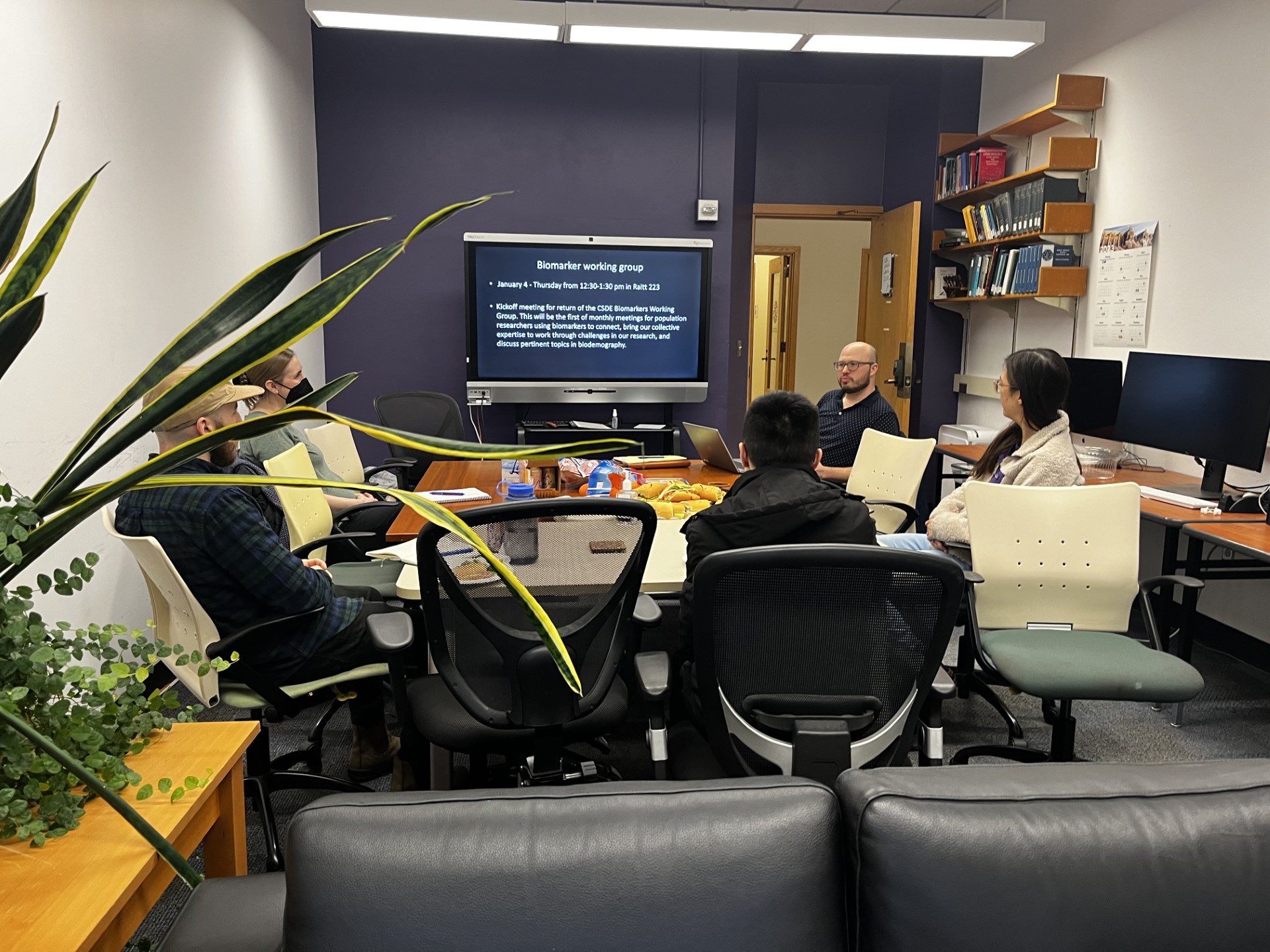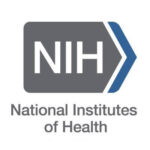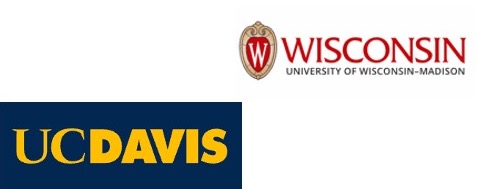*New* CSDE Science Core – Upcoming Workshops: Biomarkers, Statistics & R, Online Surveys & REDCap, Accessing Federal Data
|
In the upcoming quarter, CSDE will be hosting four workshops and one 'lunch and learn' event to facilitate researchers’ adoption of new methods and data to accelerate research programs. These workshops include an overview of portable biomarker data collection in the field, accessing federal statistical data, developing online surveys using REDCap, conducting statistical analysis with R, and an introduction to data options for research on older adults.
Each quarter, CSDE offers 3-5 workshops on data sources, statistical and biomarker methodology, introductions to analysis programs, and more, all given by CSDE staff and faculty affiliates. These workshops can include hands-on training in novel methods and programming, lectures on innovative data sources, and discussions of important issues in research and data collection. Over the course of the academic year, CSDE will offer a diverse and exciting set of workshops, some of which will be offered in person and others remotely via Zoom. Students, faculty, and staff are all welcome to register for our workshops and we welcome registrants from outside the University of Washington for our remote workshops as well.
You can find our workshop website and register for our Winter 2024 workshops in the links below. We will be filling in our schedule for Spring workshops soon, so stay tuned!
Please reach out to CSDE’s Training Director, Jessica Godwin (jlg0003@uw.edu), if you have additional workshops you would like to see offered in the future and we will do our best to accommodate those requests.
Winter Workshops
(read more)
|
 |
*New* Join CSDE for the Biomarker Working Group Kickoff Meeting!
|
Please join us for the kickoff of the Biomarker Working Group! We are building a community with diverse expertise, connected by an interest in using biomarkers for population research. This will be a space for learning about and discussing current topics and methods in biomarker research and drawing on our collective knowledge to work through challenges in our own projects.
In this first of monthly meetings, gather with other population researchers using biomarkers and learn about the resources available through CSDE’s Biodemography Lab. Lunch will be provided for those who register here by December 30.
Event Details:
- Date: Thursday, January 4, 2024
- Time: 12:30 – 1:30PM
- Location: Raitt Hall 223
(read more)
|
 |
CSDE Launches Its Lunch & Learn Series!
|
With support from the Population Health Initiative, CSDE officially launched its Lunch & Learn series on Wednesday with a successful first event! The first event was facilitated by CSDE Science Core PI Dan Eisenberg and focused on uusing “Telomere Length as a Measure of Environmental Exposures”. Participants included faculty, postdocs and graduate students from Geography, Global Health, Statistics, and School of Environmental and Forest Sciences. The Eisenberg provided an overview about how telomere length is an important determinant of senescence and can be a potential cumulative biomarker of environmental exposures. In particular, Eisenberg shared how and why telomere length predicts morbidity and mortality, especially from infectious diseases. Additionally, Eisenberg demonstrated how environmental factors such as psychosocial stressors and infections influence telomere length.
Stay tuned for details on our next Lunch & Learn event in Winter 2024 which will be led by NWFSRDC & UWDC Director Sofia Ayala!
(read more)
|
 |
CSDE Population Research Planning Grants (PRPGs) (Rolling deadline)
|
Population Research Planning Grants (PRPGs) are designed to provide in-kind support and/or funds of up to $25k* to support a wide array of activity types throughout the development of a research project. As part of our mission to complement rather than duplicate other campus opportunities such as the Population Health Initiative seed grants, we will consider funding things activities such as:
- Use of CSDE services beyond the standard allotments for affiliates. This could include statistical or computational consultations, administrative and logistical support, computer accounts, software purchases that contribute to the general good, virtual server capacity that contributes to the general good, communication or webinar support, etc.
- Convening a group of scholars for a grant writing retreat or to brainstorm a possible new research collaboration
- Hiring an RA to analyze data for discussion in the Preliminary Data section of a grant application
- Small pilot research, when relationship to future funding requests are clearly laid out. Note that research that is well suited to an existing pilot research mechanism on campus should be submitted to that mechanism, with an optional request of matching support from CSDE (see below).
- Publication-related fees (when no other funding is available). NEW THIS YEAR: requests for publication fees will only be considered for publications that involve at least one CSDE affiliate and at least one CSDE trainee, and which are targeted to a demography-oriented journal or comparable outlet.
- Travel (when specifically enhancing research project development)
- Many others; just ask!
(read more)
|
 |
CSDE Matching Support to Supplement On-campus Funding (Rolling deadline)
|
CSDE Matching Support includes in-kind or monetary support to accompany a submission to other on-campus funding mechanism, such as PHI, EarthLab, or Urban@UW. All projects must have a CSDE affiliate who is UW faculty and is listed as a PI or co-PI, with any number of other collaborators. Note that we require (PRPGs) or strongly suggest (matching funds) contacting either Development Core Director (Steven Goodreau) or CSDE Director (Sara Curran) to discuss possibilities for your specific proposal before submission.
(read more)
|
 |
*New* Issue of International Migration Review
Read the new issue here!
(read more)
*New* Issue of Population and Environment
Read the new issue here!
(read more)
*New* Issue of Journal of Ethnic and Migration Studies
Read the new issue here!
(read more)
*New* Data from IPUMs
|
IPUMs is excited to announce the release of the 2022 1-year data from the American Community Survey (ACS) through IPUMS USA and IPUMS NHGIS. There are also new data from IPUMS MTUS, IPUMS CPS, and IPUMS USA. Links to all new data are in the full story!
(read more)
|
 |
Participate in the One Seattle Open Data Mini-Hackathon (12/14/23)
|
Are you interested in using publicly available City data to design a data dashboard that tells a story or highlights an issue? Please join the City of Seattle for a friendly half-day hackathon at Tableau’s Fremont office, hosted by Salesforce. The event will take place on Thursday December 14, 2023 with a kickoff at 10:00 and presentation and awards at 2:00 PM. Teams will design and build a new dashboard or visualization that tells a story using a dataset assigned from Seattle Open Data (https://data.seattle.gov).
(read more)
|
 |
Opportunity for Graduate Fellowship: Open Scholarship Commons Community Fellows Workshop Series (Due 12/15/23)
|
The Open Scholarship Commons Community Fellows Workshop Series is a paid fellowship opportunity for graduate students underrepresented in the field of open scholarship. The goal of this Fellowship is to lift up students as experts in this field and create opportunities for peer to peer learning by offering student-led workshops. Equity is a core value of the UW Libraries Open Scholarship Commons, and this Fellowship, funded by the UW Diversity Council, aims to support the expertise and leadership of underrepresented students in the field of open scholarship.
(read more)
|
 |
RFI by the NIH: Environmental Justice Research Gaps, Opportunities and Capacity Building (Due 12/15/23)
|
The National Institutes of Health (NIH) Environmental Justice Working Group invites feedback on the approaches NIH Institutes, Centers, and Offices can take to support research and capacity building efforts to advance environmental justice in the U.S. and globally. Additionally, Request for Information (RFI) responses will enable the NIH Environmental Justice Working Group to be responsive to Executive Order 14096 on Revitalizing Our Nation’s Commitment to Environmental Justice for All, and to synergize NIH efforts with other Federal Agencies in a whole-of-government approach to advance environmental justice.
(read more)
|
 |
ACS Federal Register Comments on HH Roster, Education, Insurance Coverage, Disability, and Labor Force Questions (Due 12/19/23)
There is an active Federal Register Notice for the American Community Survey and Puerto Rico Community Survey for proposed changes to several topics including the household roster, educational attainment, health insurance coverage, disability, and labor force questions. The comment period closes December 19. Click here to leave your comments. (read more)
|
 |
*New* Calling UW Scholars on Aging: Share Your Work at GSA’s Annual Scientific Meeting (Due 12/20/23)
|
UW aging scholars are invited to present their work to Gerontological Society of America (GSA) leadership on upcoming visit to UW, fill out survey (here) by Dec. 20th if interested in presenting. The Gerontological Society of America (GSA) will be hosting its Annual Scientific Meeting in Seattle from November 13-16, 2024. In anticipation of the conference being held in Seattle, the GSA CEO James Appleby, and President Judy Howe, have asked to meet UW faculty and colleagues, graduate students, and post-doctoral trainees across the campus who are conducting research in aging. They will be on the UW Seattle campus on Thursday, February 8, 2024. Aging scholars at UW are organizing a morning forum on campus. We invite you to share your work with GSA leaders and your UW colleagues doing aging research.
(read more)
|
 |
Apply for the Latinx Scholars Graduate School Fellowship (Due 12/29/23)
|
Applications are now open for the 2023-24 Latinx Scholars Graduate School Fellowship (LSGF). LSGF awards are hosted by the Office of Graduate Student Equity & Excellence (GSEE) (formerly GO-MAP). In 2013, a group of engaged, committed UW faculty, civic, and business leaders joined together to establish the Latinx Scholars Graduate School Fellowship to provide financial assistance to UW graduate students (master’s and doctoral) who have a demonstrated commitment to Latinx communities.
(read more)
|
 |
Call for Applications: National Research Center on Poverty and Economic Mobility Early-Career Mentoring Institute (12/31/23)
|
The University of Wisconsin-Madison’s Institute for Research on Poverty (IRP) and the University of California, Davis’s Center for Poverty & Inequality Research (CPIR) invite applications for the 2024 National Research Center on Poverty and Economic Mobility Early-Career Mentoring Institute (ECMI). This weeklong convening between June 3-7, held in Davis, California, will provide valuable mentoring and career development opportunities to poverty and social mobility scholars who are in the early stages of their research careers and who have the potential for leadership in supporting members of populations that are underrepresented among academic researchers.
(read more)
|
 |
|

